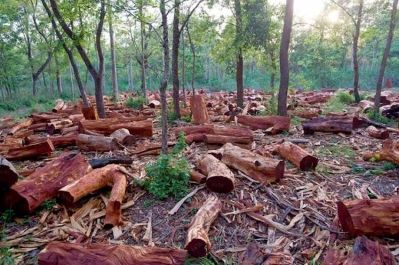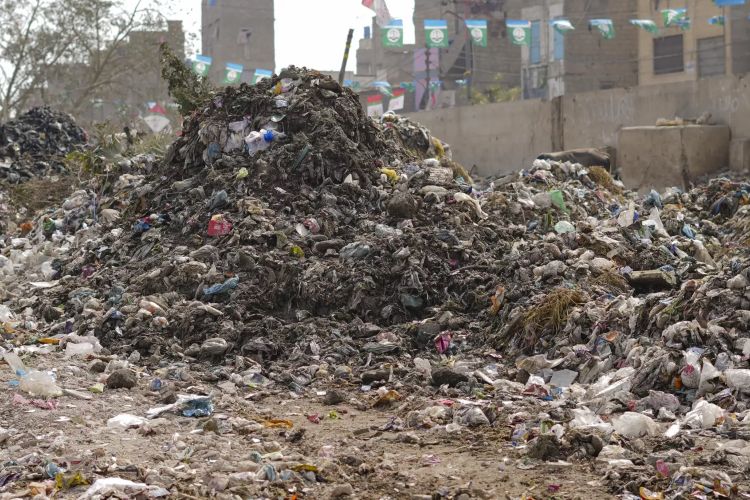Save the Nature, Save Pakistan

If deforestation continues, such disasters will become even more frequent and more dangerous.
Massive tree plantation drives should be launched in all the provinces
- Pakistan is a beautiful country gifted with mountains, rivers, forests, wildlife, and fertile lands, but unfortunately, these blessings are now in danger because of our carelessness and lack of awareness
- Environmental clubs should be formed in every school and college. These clubs can organize clean-up drives, awareness walks, and contests to motivate students to take action
Jaweria Arshad | Rawalpindi
I am writing this letter as an 18-year-old student who is deeply worried about the condition of our environment. Every day, when I read the news or scroll through social media, I come across heartbreaking stories about climate change, pollution, and natural disasters. Although these issues are increasing rapidly, many people around us still do not understand how serious the situation has become. Pakistan is a beautiful country gifted with mountains, rivers, forests, and fertile lands, but unfortunately, these blessings are now in danger because of our carelessness and lack of awareness. As a young student, I feel it is my responsibility to raise my voice and encourage others to take action.
Pakistan has always been known for its natural landscapes, from the snowy peaks of the north to the peaceful coastal areas in the south. Our forests, deserts, lakes, and rivers give life to countless plants, animals, and human beings. However, due to harmful human activities such as cutting trees, burning waste, spreading pollution, and ignoring environmental laws, our natural beauty is disappearing rapidly. If we continue damaging our environment at this pace, the future of our country will be at serious risk.
 One of the biggest environmental problems we face is deforestation. Trees are being cut down much faster than they are being planted. When forests disappear, birds, animals, and even insects lose their homes. Soil becomes weak, causing landslides, and the air becomes more polluted because there are fewer trees to absorb carbon dioxide. Pakistan has already faced major disasters due to environmental negligence. The floods of 2010 were one of the worst in our history, affecting millions of families, destroying homes, crops, and livestock. Experts say that if deforestation continues, such disasters will become even more frequent and more dangerous.
One of the biggest environmental problems we face is deforestation. Trees are being cut down much faster than they are being planted. When forests disappear, birds, animals, and even insects lose their homes. Soil becomes weak, causing landslides, and the air becomes more polluted because there are fewer trees to absorb carbon dioxide. Pakistan has already faced major disasters due to environmental negligence. The floods of 2010 were one of the worst in our history, affecting millions of families, destroying homes, crops, and livestock. Experts say that if deforestation continues, such disasters will become even more frequent and more dangerous.
Air pollution is another major threat. In cities like Lahore, Karachi, and Faisalabad, smog has become a normal part of winter. Many people, especially children and students, suffer from cough, asthma, headaches, and eye irritation during smog season. Vehicle emissions, industrial smoke, burning garbage, and using low-quality fuel are some of the main reasons behind this problem. According to international reports, Pakistan is among the top polluted countries in the world. It is sad to see that even the air we breathe has become harmful for our health.
Climate change is also affecting Pakistan in many ways. The weather has become unpredictable. Summers are getting hotter, winters are shorter, and rainfall patterns have changed completely. Farmers who depend on crops are facing huge losses because the weather no longer supports traditional farming methods. Scientists warn that by 2050, major crops like wheat could decrease by almost half, which means our country may face serious food shortages. Water scarcity is also becoming a growing problem because glaciers are melting and rainfall is irregular. If we do not act now, the next generations will struggle to find clean water, healthy food, and safe living conditions.
To save Green Pakistan, we need strong and immediate action. The government must strictly punish illegal tree cutting and encourage large-scale plantation campaigns. Projects similar to the Billion Tree Tsunami should be introduced in all provinces so that forests can grow again and wildlife can return. Clean and safe energy sources such as solar, wind, and hydro power should be promoted so that we can reduce pollution. Public transport should be improved so that fewer people rely on private vehicles, which will lower carbon emissions.
Read: Pakistan loses 11,000 hectares of forest annually
Climate-resilient buildings, stronger drainage systems, and flood protection walls must be built to prevent damage during natural disasters. Farmers should be trained in modern climate-smart farming so that they can grow crops even when weather conditions are unstable.
Awareness is the most important step. Schools and colleges should teach students about environmental protection through campaigns, tree plantation drives, cleanliness competitions, and awareness walks. Young people must understand that even small actions like planting a tree, saving water, reducing waste, and avoiding plastic can make a big difference.
 Another important step to save our environment is proper waste management. In Pakistan, most people throw garbage on streets, in rivers, or burn it openly, which releases harmful chemicals into the air. Our cities lack proper recycling systems, and many people do not know the difference between recyclable and non-recyclable waste. To protect our environment, recycling plants should be established in all major cities, and awareness campaigns should teach citizens how to separate plastic, paper, glass, and organic waste. If waste is managed properly, pollution will decrease and our cities will become cleaner and healthier places to live.
Another important step to save our environment is proper waste management. In Pakistan, most people throw garbage on streets, in rivers, or burn it openly, which releases harmful chemicals into the air. Our cities lack proper recycling systems, and many people do not know the difference between recyclable and non-recyclable waste. To protect our environment, recycling plants should be established in all major cities, and awareness campaigns should teach citizens how to separate plastic, paper, glass, and organic waste. If waste is managed properly, pollution will decrease and our cities will become cleaner and healthier places to live.
Water wastage is another issue that needs immediate attention. Many people leave taps running, wash vehicles with excessive water, and use clean drinking water carelessly. Pakistan is already facing water scarcity, and experts warn that if we continue wasting water, our country may face a severe water crisis in the future. Students like me can help by encouraging families and friends to save water, fix leaks, and reuse rainwater for gardening and cleaning.
Another important point is the protection of wildlife. Many species in Pakistan are becoming endangered because their habitats are being destroyed. Illegal hunting and poaching also harm animals like snow leopards, ibex, and sea turtles. Strict laws should be implemented to protect wildlife, and special protected areas should be created where animals can live safely without human interference.
Environmental clubs should be formed in every school and college. These clubs can organize clean-up drives, awareness walks, and contests to motivate students to take action. Young people are the future of this country, and if we learn to respect nature today, we can save Pakistan’s environment tomorrow.
In the end, I want to say that Pakistan can still be saved if we work together. Every citizen must play their role, whether it is planting a tree, reducing pollution, saving water, or spreading awareness. Our environment is a gift, and we must protect it with responsibility and love.
Read: Pakistan’s Owls Face Population Decline
_____________________
Jaweria Arshad is a law student, based in Chaklala, Rawalpindi Punjab




